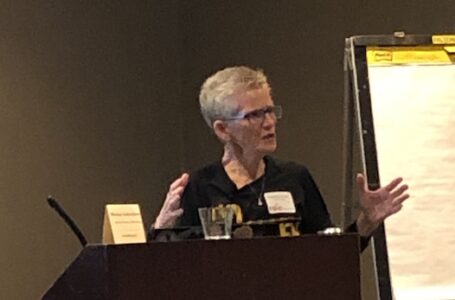When the going gets tough, your team will hold you up
by Leigh Reynolds, FSHD Society

Army Command Sgt. Maj. Gretchen Evans earned the highest rank an enlisted soldier can achieve. She was responsible for all security and personnel in Afghanistan, overseeing more than 30,000 ground troops, until enemy fire left her with a brain injury, PTSD, and total hearing loss, ending her 27-year career in the military. CSM Evans had lost her purpose and found herself in deep despair.
Eventually, Evans connected with other survivors and formed Team Unbroken, made up of mixed-ability athletes. She persuaded a skeptical TV producer to let them compete in the World’s Toughest Race: Eco-Challenge Fiji. Their feats were filmed for a documentary that is streaming on Amazon Prime Video.
We had the honor of meeting CSM Evans when she gave the keynote at our 5th Annual Volunteer Leadership Summit on a February morning at the Chicago Airport Hilton. It was frosty outside, but inside our meeting room, everyone was on fire. Sixty of our volunteer leaders from across the US and Canada gathered in person and on Zoom for two days of intensive learning, heartfelt camaraderie, open collaboration, and a little bit of fun.
Evans shared how she fought her way back to a meaningful life when she found her “rope team” who, like members of a rock-climbing team, commit to standing firm and holding you up when you need it most. She urged our own mixed-ability fighters to “find your rope team.”
“If someone slips, the rest of us pick you up,” she explained. “There’s safety and accountability in that. You have to be connected to other people in your life who are committed to you.”
Bringing the FSHD community together, literally and figuratively, is one of our highest priorities. When people form connections, they become a more informed, engaged, and empowered community – individuals with FSHD living a better life, together. An engaged community of patients and families will lead to better understanding of FSHD and faster progress toward treatments and ultimately a cure.
Our staff and volunteer leaders leaned into this theme in their presentations. Gregg Lichtenstein from our Wellness Hour spoke about the value of social capital, and how the benefits of social connection can be intangible, but are immensely powerful (see his essay on page 7.) Ally Roets from our Early-Onset chapter spoke of the critical need to engage the whole community, not just parents, to ensure our kids are not left behind.
“In a weird sense, I feel grateful to have been diagnosed with FSHD,” Heloise Hoffmann wrote afterward. “It brought me this community that feels like a family: advocating for one another, sharing strengths, leaving no one behind, and perhaps most importantly, fearlessly forging ahead as a rope team despite a daunting mission.”
We each benefit from having others to help us navigate this life. Our volunteer leaders have found their rope team in each other, and they in turn are helping their local communities build theirs. If you haven’t found your rope team, reach out to your local chapter. There is no better time.


Leave a Reply